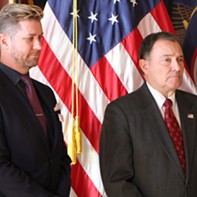Life Elevated
While a repackaged hate-crimes bill stalled in the legislative session, a Blue Lives Matter bill sailed through.
By Stephen Dark @stephenpdarkAfter years of failing to get Republican support for hate-crime legislation that would put some teeth into the law, advocates were optimistic that the 2017 session might finally bring victory. Senate Bill 72—sponsored by Sen. Daniel Thatcher, R-West Valley, and titled "Victim selection penalty enhancements"—marked a new approach to the controversial topic. It jettisoned social justice packaging in favor of focusing more on holding perpetrators of violence accountable.
SB72 would have allowed prosecutors to increase a criminal charge by one degree if an assailant attacked someone based on their "perception of the individual's ancestry, disability, ethnicity, gender, gender identity, national origin, race, religion or sexual orientation." It had the support of the American Civil Liberties Union (ACLU), the Utah Coalition of La Raza (UCLR) and the NAACP. ACLU spokesperson Anna Thomas says that her agency is typically "reluctant to endorse criminal penalty enhancements," but in the case of SB72, "we understand there is a lot at stake for regularly victimized, marginalized groups."
But the bill went nowhere. "It never even had a committee hearing," Thomas says. "It stayed in the rules committee and never got out."
Rep. Paul Ray, R-Clearfield, says hate-crime legislation will inevitably struggle to gain traction with both the Republican-dominated Legislature and the general public. "The hard part is singling out classes of people and giving them more rights and protections over other people."
But not when it comes to law enforcement. Ray's House Bill 433, which passed with little fanfare or debate at the end of the 2017 session, is in essence a Blue Lives Matter bill. He says its roots lie in his ride-alongs with law enforcement, fire and EMS crews, at a time when officers were targeted and killed in Dallas, New York and Ohio. He says he saw how traffic stops had become increasingly "high tension issues," for local officers impacted by out-of-state incidents.
Sen. Curtis S. Bramble, R-Provo, who worked with Thatcher on SB72, was also the floor sponsor for Ray's initiative. Thatcher's bill didn't have the support it needed to push forward, Bramble says. HB433 "is about law enforcement doing their job and giving them some statutory protection for carrying out the duties that we expect them to perform." The bill enhances criminal penalties for targeting a police officer, which it defines as "any offense involving the unlawful use of force and violence against a law enforcement officer, causing serious bodily injury or death in furtherance of political or social objectives in order to intimidate or coerce a civilian population."
In this tale of the fate of two bills, the perennial struggle of advocates to steer legislation indelibly tied negatively in some politicians' minds to LGBTQ rights, seems all the more doomed against the silky-smooth passage of a bill seeking to protect a community revered by many Republican legislators.
Equality Utah's Troy Williams says HB433's passage "is a strong indicator that Utah lawmakers understand the need for hate-crimes legislation. No one should be targeted just because of who they are. If cops are protected, then so too must people who are targeted because of their faith, race, ethnicity, sexual orientation or gender identity."
UCLR's President Richard Jaramillo says the resistance to the victim selection bill seems "philosophically antithetical" to the passage of Ray's bill. "It appears to be a one-way street. They see the need to protect the community of police officers. They should be able to see the need to protect other communities." he says. "It definitely shows they can see the concern when it comes to the boys in blue, but not to anyone of another hue."
While Salt Lake County District Attorney Sim Gill, a longtime advocate for hate-crime legislation, also sees parallels between SB72 and HB433, Ray rejects such notions. HB433, Ray says, is utterly distinct from anything to do with hate crimes. Rather, it focuses on what he terms "an act of terrorism," namely an individual seeking to specifically harm an officer in the performance of his or her duties.
Gill stresses that law enforcement deserves protection, but he expresses frustration at the fate of Thatcher's bill. For the past 15 years, he says, he and other prosecutors have gone up to the Legislature, "pleading for a workable tool. We need to have a community response for a community message crime." He's talked to members of the Sikh, Muslim and Jewish community in Utah who have all noted the rise of hate crimes nationwide. That includes LDS church ward houses also being targeted. "It crosses all aspects of it."
The police are indeed a worthy group to protect, NAACP President Jeanetta Williams says. "We want them to look and say ours is a worthy cause as well." While Ray highlights shootings—such as in Dallas, when a lone veteran gunman killed five officers and injured nine at a Black Lives Matter protest in July 2016—she points to not only the killings of African-American men by law enforcement across the country, but also to officer-involved shootings in Utah that have raised significant questions about accountability and transparency.
Thatcher says that supporters of his legislation should not lose hope. His bill garnered wider support than Rep. Steve Urquhart's 2016 hate-crimes bill, because "we got them to look at it as a criminal justice issue, not a social justice issue," Thatcher says. "Had it gotten to the floor, it would have passed."
Thomas says that activists feel Ray's bill is counter-productive. "It seeks to protect police officers from what is not proven to be an actual threat in Utah." It comes at a time when numerous police chiefs, such as Salt Lake City Police Department's Mike Brown, are working to improve relationships with activist-critics by regularly meeting with them. Such bills, she says, "can be really divisive when conflicts between community members and law enforcement agencies are heightened."
While Thomas says she spoke to some law enforcement leaders who saw HB433 as unnecessary and "potentially inflammatory," Ray says many police chiefs have welcomed it. Salt Lake City Police Department spokesman Detective Greg Wilking says he liked the intent of the bill to punish those who scheme to hurt or kill officers. "It sends a message to the people that are thinking about plotting against us."
Utah Against Police Brutality's Jacob Jensen believes that Ray's bill "has the purpose of dampening or chilling free speech," but will not succeed. "If people right now are willing to stand in front of riot shields, I don't think this will stop it." He argues that the way the bill holds the police above the rest of the community confirms the prejudices activists have against law enforcement—namely that they are unaccountable. "Everybody's life seems not to matter except for police lives." That said, Jensen says that Chief Brown "is way more amenable to transparency than apparently the Legislature is."
Wilking says there's no intent on his department to "set ourselves apart from anyone." Equally, he says, HB433 will not be used to pursue police critics, with whom Wilking and other officers meet every two weeks. While he acknowledges that there is some concern among activists that the bill means they will be labeled as terrorists, SLCPD does not see the bill in that way. "I don't think it, in any way, goes after or involves their groups."
Ray says activists should reread his bill. "There's nothing about social protest. It specifically deals with targeting police officers. Nobody, absolutely nobody has the right to target police officers. They deserve the stiffest penalty."
Thomas' biggest concern about Ray's bill is that a prosecutor might misapply it if "something ever occurred between a protester and the police. I hate to see this used against somebody for political speech or ideology rather than actual action."
More by Stephen Dark
-
Call it a Comeback
Long mired in economic depression, Midvale’s Main Street dusts off its small-town charm.
- Sep 20, 2017
-
Love Letters
Correspondence between a young woman at the Topaz internment camp and her beloved sheds light on Trump's America.
- Sep 6, 2017
-
Triggered
Veterans Affairs exists to help vets. So why did the Salt Lake VA appoint an anti-veteran chief?
- Aug 30, 2017
- More »
Latest in News
Readers also liked…
-
Raise a glass for E.L.T Harrison, architect of the Beerhive building on Main
Small Lake City
- Oct 11, 2023






